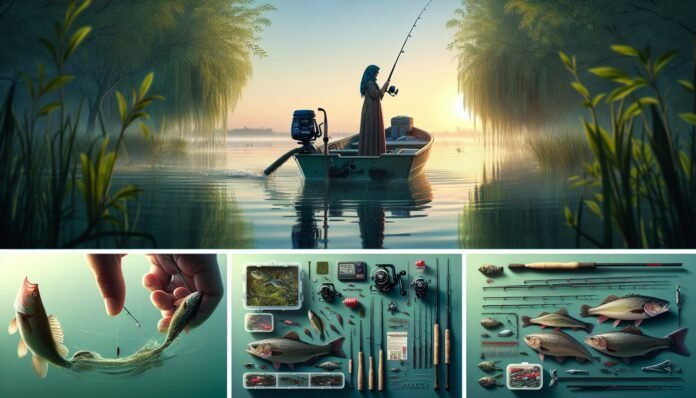freshwater fishing mistakes can ruin even the most promising trips, turning a day of relaxation into unnecessary frustration. From using the wrong bait to ignoring water conditions, common errors can cost you a successful catch. Many anglers, beginners and experienced alike, fall into these traps without realizing it. Understanding these mistakes and how to avoid them is crucial for improving your skills and enjoyment on the water. Discover the key pitfalls to steer clear of and ensure your next fishing adventure is productive and stress-free.
Top Mistakes in Freshwater Fishing That Reduce Your Success Rate
Freshwater fishing offers moments of excitement and tranquility, but common mistakes can hinder success. Understanding these pitfalls is crucial for improving catch rates and enhancing the fishing experience.
Using the Wrong Bait for Freshwater Fish Species
The bait you choose can make or break your fishing trip. Many anglers fail to research the preferences of their target fish species. Fish have specific dietary habits that vary by species and location. Using inappropriate bait can lead to long, unproductive hours on the water.
Consider the natural prey of the fish in your chosen fishing spot. Live bait such as worms and minnows are often effective, while artificial lures can mimic the look and movement of a fish’s natural diet. Match your bait to the behavior and feeding patterns of your target species for optimal results.
Ignoring Seasonal Fish Behavior and Migration Patterns
Seasonal changes can dramatically impact fish behavior and migration. Many anglers miss out because they don’t adjust their strategies according to these patterns. Fish migrate to different areas depending on the time of year, seeking food or suitable breeding grounds.
Study the seasonal behaviors of the fish species in your area. Spring often brings fish closer to shorelines for spawning, while summer may drive them into deeper, cooler waters. Adjusting your fishing techniques to align with these patterns increases your chances of a successful catch.
Neglecting Your Fishing Gear Maintenance and Setup
Proper maintenance and setup of fishing gear are crucial for a successful outing. Anglers often overlook the importance of keeping their equipment in top condition. Regular checks and maintenance prevent unexpected failures that can ruin a fishing trip.
Inspect rods and reels for wear and tear, and ensure lines are free of knots or weak spots. Clean and lubricate moving parts to maintain smooth operation. Organizing your tackle box and knowing your gear inside out can make your fishing experience smoother and more enjoyable.
How Environmental Awareness Can Improve Your Freshwater Fishing Trips
Environmental factors play a significant role in freshwater fishing success. Being aware of these elements can greatly enhance your fishing trips and ensure sustainable practices.
Overlooking Water Temperature and Its Impact on Fish Habits
Water temperature significantly affects fish behavior and activity levels. Fish are cold-blooded, relying on their environment to regulate body heat. Anglers who overlook this can struggle to find active fish.
Identify the preferred temperature range for your target species. Fish may become lethargic in temperatures outside their comfort zone. Use a thermometer to measure water temperature, and adjust your tactics accordingly to optimize your fishing efforts.
Failing to Recognize Signs of Fish Activity in Freshwater Bodies
Recognizing signs of fish activity can lead to more productive fishing. Anglers often overlook subtle cues indicating where fish are feeding or moving. Understanding these signs requires attention to detail and a keen sense of observation.
Look for ripples on the water’s surface, fish jumping, or birds diving for fish. These are indicators of active fish nearby. Pay attention to insect activity, as it often attracts fish to specific areas. Observing these signs helps you target the most promising locations for casting your line.
Fishing in Poorly Chosen Locations at the Wrong Times
Location and timing are critical components of successful fishing. Many anglers choose spots based on convenience rather than fish behavior or environmental conditions. This can lead to disappointing results.
Research the best fishing spots in your area, focusing on factors like water depth, structure, and cover. Consider the time of day, as dawn and dusk are often peak feeding times. Fishing in the right location and at the right time increases your chances of landing a good catch.
Strategies to Avoid Common Freshwater Fishing Errors
Improving your fishing techniques can prevent common errors and increase your success rate. These strategies help refine your skills and enhance your overall fishing experience.
Choosing the Right Fishing Knots to Secure Your Catch
Using the correct fishing knot is essential for securing your catch. Many anglers lose fish due to poorly tied knots that fail under pressure. Knowing a variety of knots and when to use them can make a significant difference.
Learn popular knots like the Palomar, improved clinch, and loop knots. Each has unique strengths for different situations. Practice tying these knots until you can do so quickly and accurately, ensuring your tackle is secure and ready for action.
Understanding Proper Casting Techniques for Accuracy and Distance
Effective casting is a fundamental skill in freshwater fishing. Poor casting technique can result in missed opportunities and tangled lines. Focusing on accuracy and distance will improve your ability to reach target areas where fish are active.
Practice different casting methods, such as overhead, sidearm, and roll casts. Each technique is suited to specific situations and environments. Regular practice enhances your ability to cast with precision and place your lure exactly where it needs to be.
Learning How to Match Your Lure to Water Clarity and Depth
Choosing the right lure is crucial for enticing fish to bite. The effectiveness of a lure depends on water clarity and depth. Anglers often make the mistake of using the wrong lure for the conditions, leading to missed catches.
In clear water, use natural-looking lures that mimic the prey fish would typically hunt. In murky conditions, opt for brightly colored or vibrating lures to attract attention. Adjust the weight and size of your lures to match the water depth and ensure they reach the desired fishing zone.
Conclusion
Common freshwater fishing mistakes include using the wrong bait, neglecting seasonal fish behavior, and failing to maintain gear properly. Environmental factors like water temperature and fish activity cues play a crucial role in fishing success. Choosing poor locations and timing can significantly reduce catch rates. Key strategies involve mastering fishing knots, improving casting techniques, and selecting lures based on water clarity and depth. Adapting methods to fish behavior and maintaining equipment enhances the overall fishing experience.
How can I avoid common freshwater fishing mistakes as a beginner?
Start with simple gear to master the basics. Learn to read the water and fish behavior, practicing patience and observation. Educate yourself on local regulations and fish species to avoid costly mistakes. Joining a fishing community or online forum can provide valuable insights and tips from experienced anglers.
What are the most overlooked equipment errors in freshwater fishing?
Using the wrong line strength and knot types can lead to lost catches. Regularly check for rod and reel wear and tear to avoid equipment failure. Keep tackle organized to prevent time-consuming tangles. Many beginners also forget to sharpen hooks, resulting in missed fish.
Why is proper lure selection important for freshwater fishing success?
Lure selection directly impacts your catch rate. Different fish species respond to varying colors, sizes, and actions of lures. Matching the lure to the local baitfish and water conditions can entice more bites. Experimenting with different types helps identify what works best for your targeted species.
How does weather affect freshwater fishing conditions and strategies?
Weather patterns influence fish behavior and feeding times. Overcast days often encourage fish to be more active, while high-pressure systems can cause them to be sluggish. Wind direction and speed affect casting accuracy and lure presentation. Adjusting techniques based on weather ensures better chances of success.
What are the key techniques to improve freshwater fishing accuracy?
Practice casting regularly to enhance precision. Using landmarks as targets helps with aim. Adjusting rod position and grip can refine control. Focus on smooth, consistent motion rather than forceful casts. Consistent practice leads to improved accuracy over time.
How do I pick the best freshwater fishing spots near me?
Research local water bodies, considering factors like fish species and accessibility. Use online maps and fishing apps to locate promising areas. Ask local anglers and bait shops for recommendations. Visiting spots at different times of day can reveal the most productive locations.

